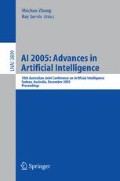Abstract
Methods of adaptive constraint satisfaction have recently become of interest to overcome the limitations imposed on “black-box” search algorithms by the no free lunch theorems. Two methods that each use an evolutionary algorithm to adapt to particular classes of problem are the CLASS system of Fukunaga and the evolutionary constraint algorithm work of Bain et al. We directly compare these methods, demonstrating that although special purpose methods can learn excellent algorithms, on average standard evolutionary operators perform even better, and are less susceptible to the problems of bloat and redundancy.
Access this chapter
Tax calculation will be finalised at checkout
Purchases are for personal use only
Preview
Unable to display preview. Download preview PDF.
References
Wolpert, D.H., Macready, W.G.: No free lunch theorems for optimization. IEEE Transactions on Evolutionary Computation 1(1), 67–82 (1997)
Minton, S.: Automatically configuring constraint satisfaction programs: A case study. Constraints 1(1), 7–43 (1996)
Epstein, S.L., Freuder, E.C., Wallace, R., Morozov, A., Samuels, B.: The adaptive constraint engine. In: Van Hentenryck, P. (ed.) CP 2002. LNCS, vol. 2470, pp. 525–540. Springer, Heidelberg (2002)
Bain, S., Thornton, J., Sattar, A.: Evolving variable ordering heuristics for constrained optimization. In: van Beek, P. (ed.) CP 2005. LNCS, vol. 3709. Springer, Heidelberg (2005) (to appear)
Bain, S., Thornton, J., Sattar, A.: Methods of automatic algorithm adaptation. In: Zhang, C., Guesgen, H.W., Yeap, W.-K. (eds.) PRICAI 2004. LNCS (LNAI), vol. 3157, pp. 144–153. Springer, Heidelberg (2004)
Schuurmans, D., Southey, F.: Local search characteristics of incomplete SAT procedures. Artificial Intelligence 132(2), 121–150 (2001)
Fukunaga, A.: Automated discovery of composite SAT variable-selection heuristics. In: Proceedings of AAAI 2002, pp. 641–648 (2002)
Fukunaga, A.: Evolving local search heuristics for SAT. In: GECCO 2004 (2004)
Koza, J.: Genetic Programming: On the programming of computers by means of natural selection. MIT Press, Cambridge (1992)
Holland, J.H.: Adaptation in natural and artificial systems, 2nd edn. MIT Press, Cambridge (1992)
Author information
Authors and Affiliations
Editor information
Editors and Affiliations
Rights and permissions
Copyright information
© 2005 Springer-Verlag Berlin Heidelberg
About this paper
Cite this paper
Bain, S., Thornton, J., Sattar, A. (2005). A Comparison of Evolutionary Methods for the Discovery of Local Search Heuristics. In: Zhang, S., Jarvis, R. (eds) AI 2005: Advances in Artificial Intelligence. AI 2005. Lecture Notes in Computer Science(), vol 3809. Springer, Berlin, Heidelberg. https://doi.org/10.1007/11589990_142
Download citation
DOI: https://doi.org/10.1007/11589990_142
Publisher Name: Springer, Berlin, Heidelberg
Print ISBN: 978-3-540-30462-3
Online ISBN: 978-3-540-31652-7
eBook Packages: Computer ScienceComputer Science (R0)

